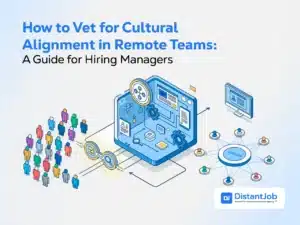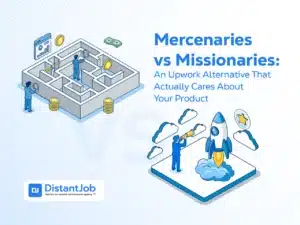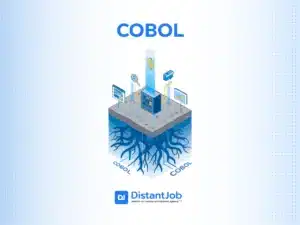If you are running a company with several software engineers, you probably need an engineer manager. While interviewing the candidates, you should ask specific engineer manager interview questions to get the best candidate out of the lot.
Candidates are often confident that they are an excellent fit for the role but forget about this important aspect: can they manage teams? You not only want someone who is an extraordinary software engineer and has an impressive professional trajectory.
You also want someone who knows how to deal with teams and assumes all the responsibilities of this role; from management style to personality traits.
22 Engineer Manager Interview Questions
1. Why would you like to work for our company?
This question will help you know the level of interest the candidate has in the job at hand. The answers you will get will also give you an idea of what the candidate values most about your company.
The goal is to get a candidate who aligns with the values of your company. The alignment with values is the critical way to ensure that they fit into your culture.
2. How did you end up in a management position, and what drives you to continue?
You can use this question instead of directly asking about the interviewee’s work experience. When someone is answering this question, they will usually take you through their employment journey and why they eventually got interested in management. It will also help you understand what motivates the candidate the most.
3. Imagine you need to build a new web app interface, what will be your process to achieve it?
This case scenario question is basically (secretly) asking a candidate: How do you prioritize work?
Of course, you can change the example to any other one, but what you want to understand is the candidate’s process toward achieving the final goal.
Engineering managers should have the ability to prioritize and schedule the tasks in a way that allows them to build the final product, which in this case, is the web app interface. But for this, they can’t just start delivering random tasks to the team, hoping everything turns out well.
They need a system. And they also need to know in a team who’s good at what. After making a plan on how to achieve this, they can delegate tasks and get to work.
4. If you had to manage a team of 10 developers how would you control how the project is going and the tasks among the developers?
This relates to the previous question but requires more details. A successful engineering manager knows the strengths and weaknesses of the team. They also know what each person is good at and what they are bad at, so instead of making everyone handle 10 tasks, they rather have each developer take one task but do it perfectly.
Also, in this question, you might learn if candidates work under a specific methodology. For example, some engineering managers love working with Agile. Others prefer Kanban or any other SDLC model.
5. What do you think about micromanaging?
This question will help you know whether the candidate understands micromanaging and its disadvantages. Micromanagement can hamper motivation and creativity and often indicates a lack of trust in people. It can lead to a stressful work environment and also lead to a high employee turnover in the long-term. That’s why your goal is to get an engineer manager who is not a micromanager because it is not an effective management strategy. You may also ask them a follow-up question regarding their strategies to avoid becoming micromanagers.
6. How would your last team describe you?
The goal with this question is to get a summary of how the candidate perceives themselves regarding their previous job. Most of the time, when someone is asked this question, they will answer it based on how they think they performed at their previous job. You may have to ask follow-up questions based on the answer the candidate gives you. You can also ask this question to their former team member or manager during reference check. This will help you get an in-depth understanding of their management style.
7. Did you have any communication problems in the past with a software engineer? How did you solve them?
Hiring IT talent is not a walk in the park; it can get frustrating when you interview thousands of candidates, and no one seems to fulfill your expectations.
Imagine for a moment that you finally found the developer you were looking for after months of intense search. This person has outstanding talent, and the best part is they are not asking for a Silicon Valley salary. So you hire them without a doubt — only to find out later they lack communication skills.
With this question, you want to see how an engineering manager solved a similar issue in the past. If they quickly decided to fire the developer and continue the intense search, or if they provided the team member with tools to develop their communication skills.
8. When and how do you promote an engineer?
One of the core roles of an engineer manager is to appraise members of his team and also give them positions where they perform at their best.
This question will help you understand if the candidate is competent enough to manage this role. A good engineer manager promotes based on one’s previous performance at their current role and their potential to take on the next role.
9. How do you help your team members to improve?
An engineer manager is a leader. They need to help everyone on their team to improve their productivity and efficiency. With this question, the goal is to assess if the candidate has practical strategies that they can use to help your engineers to get better at their day-to-day tasks. You should also determine if their suggestions can be applied in your company’s current setup.
10. Using an example from your previous job, explain how you managed to overcome a potential challenge by applying preventive solutions ahead of time?
This question will help assess the candidates’ creativity and problem-solving skills. Any good engineer manager needs to analyze situations ahead of time and lay down proactive measures to deal with them before they happen.
11. What was the most difficult decision you had to make in your previous role?
This question will tell you about the candidate’s ability to reflect as well as their approach towards decision-making. It is an important ability for an engineer manager to take tough calls when there is no right or wrong answer. Look for their clarity and depth of thought in defining the problem, constraints, and the different factors they considered to make that difficult decision. The best candidates will also explain the impact of that decision and what they learned from it.
12. Tell me about the biggest disagreement you had in a previous project and how did you manage to solve it?
In the office, it’s quite common for disagreements to happen. It’s even healthy to have disagreements because they can lead to debate and the creation of new ideas.
This question will help you understand how a candidate thinks about disagreements, if they act rationally, if they encourage constructive conflict or if they try to avoid it at all costs.
This question’s primary goal is to understand more about how they have used their communication skills and their problem-solving skills to deal with conflict in their previous experience.
13. How do you break down complex projects into smaller tasks?
Your engineer manager will often have to break down big projects into small tasks that he can assign to members of his team. This question will help assess their potential when handling complex projects. You can ask questions about techniques they use in project management such as agile methodology, kanban system, waterfall system, etc. After all, it is a critical ability to assess projects, associated deliverables, and ensure that the right people in the team work on those deliverables that are aligned with their individual skill set and workload.
14. Which project management tools are you familiar with?
There are quite a number of project management tools, like Basecamp or Asana, that engineer managers can use to manage projects in their companies.
With this question, your goal is to determine whether the candidate has an idea regarding how these tools work. It doesn’t necessarily require them to have experience with the project management tools you already use. But if they do, that is even better.
15. How do you deal with underperforming engineers?
It is a pretty common situation in companies where you find some of the team members tend to underperform when compared to the rest. So, an engineer manager needs to find means of helping such team members to improve. The main goal of this question is to assess the candidate’s ability to help his team members improve if their performance is below the minimum expectations of the company.
16. How do you handle team members that are more talented than you?
Some of the most challenging people to manage are those that are more talented than you in some technical aspects. Your engineer manager needs to have the charisma to command respect from everyone on the team, including those who are better than them in some aspects. Your goal is to determine if the candidate has experience handling such people and how they were able to do it.
17. How best can you manage remote engineers?
If your company has some engineers that work remotely, you will need to know how your potential engineer manager can motivate them despite not being in physical contact with them. How your candidates answer this question will give you an idea of whether they know what it takes to manage a remote team and the tools they need to do it.
18. How can you solve a conflict between two of your team members?
In some unfortunate events, conflict management is one of the roles that your engineer manager will have to take on. This question will help you assess if your engineer manager knows the main causes of conflict. Most of the time, conflicts between members are caused by poor communication, unaligned objectives, or unclear job roles. You need to ensure you choose a candidate with an idea of the causes of conflict and how to proactively avoid disputes before they even arise.
19. How do you choose the best technology to handle a given problem?
Handling projects in your company will often require your engineer manager, together with his team, to decide on the best technology they can use to effectively do the project. This question will help you know if the candidate has ever faced a situation where they had to choose the right technology to handle it.
20. How do you manage multiple high-priority projects?
Are they going to try to do all the projects simultaneously? Do they have a process to decide which projects go first?
It often happens that engineering teams, mostly those with many team members, need to work on different projects at once. Without a project management system and a leader who is aware of everything that is happening, it’s impossible to achieve them all successfully.
With this question, you’ll understand how a candidate prioritizes projects and what methodologies they use to either work on them simultaneously or work on them by specific tasks and goals.
21. What is your approach when hiring software engineers?
This question is the equivalent of asking: what do you value the most in your employees?
When hiring employees, besides the soft and hard skills, most managers want to make sure that a candidate is a good culture fit as well. This is important for employee engagement, and overall, to create a culture with employees who understand their role and the company’s goals.
It’s essential to make sure that your new engineering manager has the same priorities as you do when hiring employees. This means that if you value, for instance, culture, that they value it as well.
22. What do you consider to be the most important skills for this role?
Many lead developer interview questions will help you understand how a candidate thinks and how they will act on the role. Despite looking simple, this question will help you perceive how an engineering manager understands their role and responsibilities.
Many skills make up this job, but the ones that they answer you are the ones they likely consider crucial for their role. It might be a mixture of soft skills with hard skills, or maybe just hard skills. But the aspect to highlight with this question is that you will understand if a candidate is in sync with the skills you value the most for the job.
What is the role of an engineering manager?
The primary role of an engineer manager is to finish all key projects and engineering tasks in an efficient way that meets business goals. This involves planning and allocating tasks to the different engineers and any other people on his team. An engineer manager also has to ensure that all engineers on his team have the tools they need to do the work assigned to them.
Skills Hiring Managers look for in an Engineering Manager
An engineering manager is responsible for organizing and supervising an entire team of engineers. They ensure that all the key projects, goals, and engineering duties are up to date. And whenever problems arise, they help the team find the best solutions to overcome the roadblocks.
Here are the main hard skills to look for in engineering managers before interviewing them:
- Experience with Python codebases and Bash
- Robust and practical experience with Microsoft Azure, Google’s GCP, or Amazon AWS with their cloud services and other product offerings.
- Experience designing, writing, and maintaining cloud-based applications leveraging its service offering (e.g, EC2+S3+DynamoDB)
- Experience setting up CI/CD pipelines, such as Jenkins, CircleCL, Github, AzureDevOps, or similar.
- Knowledge of Ubuntu/Debian system administration or Linux.
- Experience interacting with one of the major cloud platforms via their SDKs for automation.
Note: Depending on the role you need and the tech stack your company uses, you might require different skills for an engineering manager.
Hire an Engineering Manager with DistantJob!
Hiring an engineering manager is about making sure they have the necessary hard skills they need for the job as well as leadership and management skills.
Once you got in an remote interview with the possible candidate, after the recruiter found you the right one, it all comes down to you, as the hiring manager, to ask the right questions and decide if he/she is the right fit to manage your engineering team.
If all these questions and processes make you feel as if you were floating in a galaxy far-far away, adrift in space, don’t worry. At DistantJob, as remote tech recruiters, we can help you hire a talented engineering manager in no time! Contact us and let us scale your team with the best talent from all over the world.
If you’re interested in exploring new career opportunities reach out to the engineering recruiters at our Job Page.





